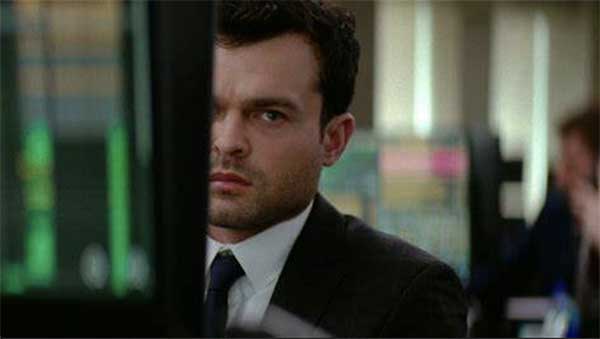Chloe Domont’s Fair Play is a slick psychological thriller that takes unwavering aim at ambition, jealousy, and the corrosive nature of secrecy.
Certain films are best described as a journey, and that’s exactly what Chloe Domont’s directorial debut Fair Play manages to achieve. The amount of character development and relationship drama that she manages to cover in less than two hours is outstanding, leaving the film’s last frame almost unrecognisable from the first. Fair Play is about the crumbling relationship between Emily (Phoebe Dynevor) and Luke (Alden Ehrenreich), two high-stakes stockbrokers who’ve been dating in secret against company policy. But when Emily is given an important promotion that Luke had been expecting, the couple’s newfound power imbalance begins to burn their relationship from the inside out.
Fair Play is less of a character study and more a study of the intangible dynamic between them, commenting sharply and bitterly on the fragility of the male ego and the all-consuming power of female ambition. From start to finish, Domont’s film is brimming with subtle tension that might not always be noticeable, but every scene pushes these characters a little further towards the story’s explosive climax, where these buried secrets and repressed emotions finally come to light and justify everything that’s preceded it. The story is slick and seductive, using the romantic (and hostile) tension between this couple to suck the audience in and never letting them go as Luke and Emily fall deeper and deeper into a void of anger and bitterness that tears them apart.
Alongside the complex character dynamics, Fair Play also has an intense narrative that’s rooted in the world of stockbroking and trading, as both Emily and Luke attempt to climb the ladder of their company. These high-stakes scenes blend perfectly with the couple’s relationship drama, with their anger and bitterness in the workplace taking its effect at home and giving Domont the perfect opportunity to explore how gender roles can differ in both places. All these styles mesh together perfectly, with the commercial drama of The Big Short meeting the romantic tensions of Marriage Story and creating a slick thriller in the vein of Basic Instinct.

Undeniably, the strongest aspect of Fair Play is the acting, with both Alden Ehrenreich and Phoebe Dynevor soaring to new heights and proving two of the strongest performances seen on-screen this year. Ehrenreich perfectly captures his character’s uncontrollable fall from grace, while Dynevor shines in his shadow as the devoted fiancee torn between love and success. Both actors are sensational and their chemistry is palpable, which is so important for a story that relies so heavily on the complicated dynamics of their relationship.
There have been few movies in the past years that have captured this specific kind of relationship quite as accurately and authentically as Fair Play. There isn’t a single second where audiences could accurately predict what’s going to happen next – we’re thrown into the exact same endless whirlwind as Emily and Luke, watching as they both make terrible choices that are somehow still believable.
Excellent characterization and powerful writing really allow Fair Play to shine where it easily could’ve failed, transforming two simple (yet true) stereotypes into fully-fledged characters with real emotions and consistent behaviour. Everything about Fair Play works: it’s a slick, seductive, and steamy thriller that places the characters first and brings them to life with emotive and naturalistic performances that beg to be remembered.
Fair Play is now available to watch globally on Netflix.

